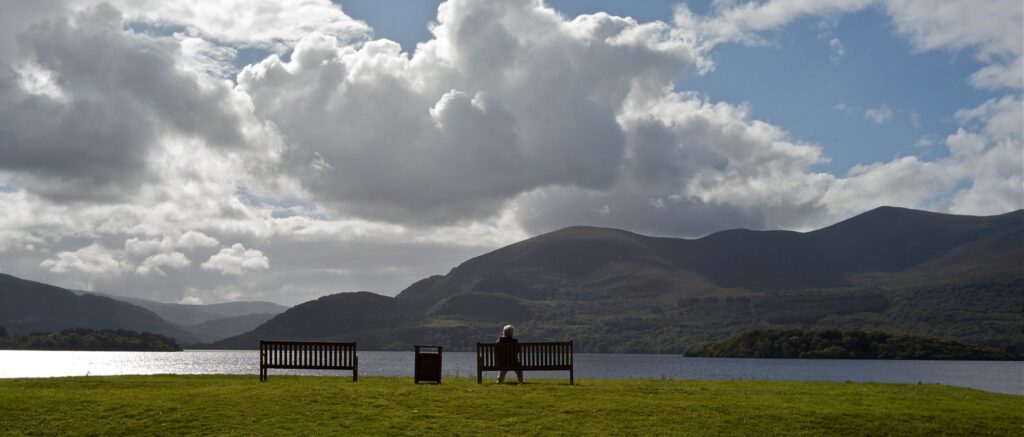Zoom with a view
Killarney, viewed from Aghadoe Heights.
Quote of the Day
”The four stages of man are infancy, childhood, adolescence and obsolescence”
- Art Linkletter
Musical alternative to the morning’s radio news
Bob Dylan | Mr. Tambourine Man | Live at the Newport Folk Festival | 1964
Gosh! This old recording was a discovery for us ageing hippies.
Long Read of the Day
Why do people feel like their academic fields are at a dead end?
Terrific long blog post by Noah Smith who says that, in recent years, he’s noticed a lot of thinkpieces in which people talk about their academic fields hitting an impasse.
Maybe academics just always tend to think their fields are in crisis, until the next big discovery comes along. After all, some people thought physics was over in the late 19th century, just before relativity and quantum mechanics came along. Maybe the recent hand-wringing is just more of the same?
Perhaps. On the completely opposite side, there’s the “end of science” hypothesis — the idea that most of the big ideas really have been found, and now we’re sort of scraping the bottom of the barrel for the Universe’s last few remaining secrets. This is the uncomfortable possibility raised by papers like “Are Ideas Getting Harder to Find?”, by Bloom et al. (2020).
But in fact, I have a third hypothesis, which sort of strikes a middle ground. My conjecture is that the way that we do academic research — or at least, the way we’ve done it since World War 2 — is not quite suited to the way discovery actually works.
Aha! Now we’re onto something. He’s an amazing blogger, always original, always worth reading.
So… read on.
Life Expectancy Could Rise a Lot. Here’s What it Means
Interesting column by David Brooks.
Sample:
Even if you beat lung cancer or survive a heart attack, your body’s deterioration will finish you off before too long. The average 80-year-old suffers from around five diseases.
That’s why even if we could totally cure cancer, it would add less than three years to average life expectancy. A total cure for heart disease would give us at best two extra years.
To keep the longevity train rolling it may not be enough to cure diseases…
Endow Jones index crashes to Earth
Nice rant from Dave Pell in his daily newsletter
It was called the sharing economy. But what really being shared was billions of investment dollars from tech venture capital firms looking to use money as a weapon in the race to the top. What it meant for consumers was that our rides, resorts, and refreshments were all being subsidized by investors as part of a customer acquisition land grab. The prices seemed too good to be true because they were. “For years, these subsidies allowed us to live Balenciaga lifestyles on Banana Republic budgets. Collectively, we took millions of cheap Uber and Lyft rides, shuttling ourselves around like bourgeois royalty while splitting the bill with those companies’ investors. We plunged MoviePass into bankruptcy by taking advantage of its $9.95-a-month, all-you-can-watch movie ticket deal, and took so many subsidized spin classes that ClassPass was forced to cancel its $99-a-month unlimited plan. We filled graveyards with the carcasses of food delivery start-ups — Maple, Sprig, SpoonRocket, Munchery — just by accepting their offers of underpriced gourmet meals.” But at a point, even the winning companies have to charge more than they spend. And in many cases, that point appears to be now. In short, your allowance just got cut off.
This was triggered by an interesting NYT piece by Kevin Roose on how chickens have come home to roost for the sovereign-wealth-funded unicorns.
A few years ago, while on a work trip in Los Angeles, I hailed an Uber for a crosstown ride during rush hour. I knew it would be a long trip, and I steeled myself to fork over $60 or $70.
Instead, the app spit out a price that made my jaw drop: $16.
Experiences like these were common during the golden era of the Millennial Lifestyle Subsidy, which is what I like to call the period from roughly 2012 through early 2020, when many of the daily activities of big-city 20- and 30-somethings were being quietly underwritten by Silicon Valley venture capitalists.
But guess what? The laws of economic gravity are beginning to assert themselves.
Now, users are noticing that for the first time — whether because of disappearing subsidies or merely an end-of-pandemic demand surge — their luxury habits actually carry luxury price tags.
“Today my Uber ride from Midtown to JFK cost me as much as my flight from JFK to SFO,” Sunny Madra, a vice president at Ford’s venture incubator, recently tweeted, along with a screenshot of a receipt that showed he had spent nearly $250 on a ride to the airport.
“Airbnb got too much dip on they chip,” another Twitter user complained. “No one is gonna continue to pay $500 to stay in an apartment for two days when they can pay $300 for a hotel stay that has a pool, room service, free breakfast & cleaning everyday. Like get real lol.”
Sigh. Never having used Uber or Airbnb in those venture-funded days, I missed out on all those discounted treats.
This blog is also available as a daily email. If you think this might suit you better, why not subscribe? One email a day, Monday through Friday, delivered to your inbox at 7am UK time. It’s free, and there’s a one-click unsubscribe if you decide that your inbox is full enough already!

